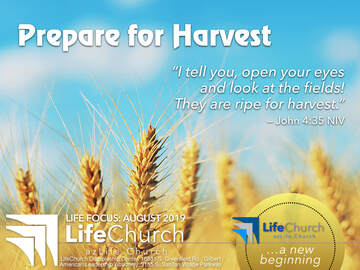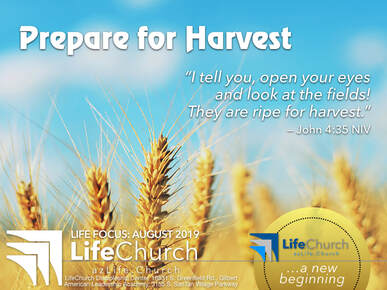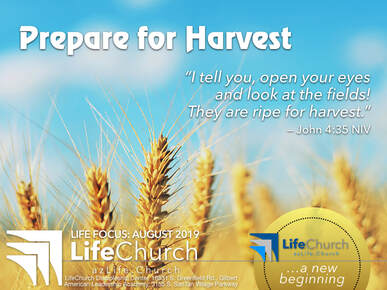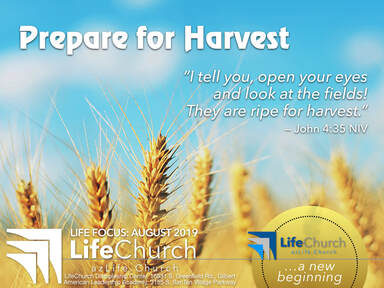AuthorTerry R Baughman is Lead Pastor for LifeChurch in Gilbert, AZ. See his complete bio at trbaughman.com Archives
July 2024
Categories |
Back to Blog
Urgency in the Reaping8/25/2019  Urgency in the Reaping PREPARING FOR THE HARVEST Terry R. Baughman “Lift up your eyes and look at the fields, for they are already white for harvest!” (John 4:35). The late hour and the immensity of the harvest demand participation of all available workers. There is no excuse for loitering in the marketplace. There should be no lack of employment when there is no end to the resources available and no shortage of opportunities for engagement. The harvest is the entire focus of our vision and the obsession of all activity. It is possible that we have talked of this day so long we may fail to recognize when the moment of fulfillment has arrived. We have discussed methods and procedures in preparation for the day of harvest, but never considered the immensity of the increase and our total inability to produce enough workers to process the reaping. The church of the end time can identify with the landowner at the center of the parable of the workers in the marketplace. He found himself seeking workers for his fields throughout the day. From early morning to late afternoon he returned to the market in hopes of finding someone to work the harvest and reap the plentiful produce. Finally, in desperation to beat the darkness in the final hour before sunset he returned to seek more workers. It was recorded that the landowner, “found others standing idle” (Matthew 20:6). Though they complained that no one had hired them He immediately contracted with this last crew, “You also go into the vineyard, and whatever is right you will receive” (Matthew 20:7). It is the hour of desperation. There is urgency in the harvest. Now is the time for reaping. We must not allow any to be wasted. It’s time to enlist the idle; conscript the lazy; employ the excuse-maker. Anyone who is able can be used. Anyone willing can assist. Maybe it is time for another visit to the marketplace. Look for the hangouts, the places where the unemployed and unmotivated recline. Find those who for whatever reason have failed to find their place in the field. Motivate them. Persuade them. Convince them to help in the harvest. Our day is the final hour. It is the time of eleventh hour urgency. Paul’s call is our cry, “Behold, now is the accepted time; behold, now is the day of salvation” (2 Corinthians 6:2). Never has the Gospel been so relevant and the message so necessary. Jesus predicted, “This gospel of the kingdom will be preached in all the world as a witness to all the nations, and then the end will come” (Matthew 24:14). This is the time for which we have waited, the moment of which we have dreamed. We war against the ticking clock and impending darkness. Jesus said, “I must work the works of Him who sent Me while it is day; the night is coming when no one can work” (John 9:4). The darkness mocks our efforts and sunset screams, “It’s over,” but we are not done. The night is not here yet. While there is any time left we will strain to see in the dusk and reach for more until there is no more light. We cannot stop the clock but we can enlist workers, encourage laborers, and join the reapers in the fields. It is all hands on deck. It is time for a concerted effort to evangelize; unite the forces for prayer; teach, train, and advance the kingdom of God by every means possible. This is an emergency. There is urgency in the reaping! Scripture: “Neither he who plants is anything, nor he who waters, but God who gives the increase” (1 Corinthians 3:7).
0 Comments
Read More
Back to Blog
Patience in the Process8/18/2019  Patience in the Process PREPARING FOR THE HARVEST Terry R. Baughman “He who sows to the Spirit will of the Spirit reap everlasting life. And let us not grow weary while doing good, for in due season we shall reap if we do not lose heart” (Galatians 6:8–9). So, we sow. Then we water. Now we wait. Farming is not for the anxious or the impulsive individuals. It requires patience. Growth takes time. Maturity does not emerge overnight, nor does fruit develop in an instant. That is not to imply that the farmer does nothing while awaiting the time for harvest. There is always something to do. Equipment often needs repair, servicing, and cleaning. Fences need mending and buildings require maintenance. There is a never ending to-do list of projects. The harvest, however, necessitates a hands off season of just waiting. Sometimes the rows can be plowed or weeds removed, but the plants that are growing toward harvest cannot be disturbed lest their health should be compromised and their fruitfulness be thwarted. Growth is quite natural and will come at the rate it is designed to produce. Growing is a process and it is continual. Some varieties grow rapidly and develop their fruit within days, while others take years to reach maturity. We all enjoy the reaping and the benefits of harvest, but there’s a whole lot of waiting in-between times. Harvest is not just the fruit of our labor and the produce of what we have sown. We can also reap a harvest where others have sown. Jesus announced to the disciples who were with Him in Samaria, “Lift up your eyes and look at the fields, for they are already white for harvest!” Then, He continued to explain the process, “One sows and another reaps. … I sent you to reap that for which you have not labored; others have labored, and you have entered into their labors” (John 4:35; 37–38). We are all part of the process. Whether sowing or reaping, watering or weeding, we are all participants in the harvest of eternity. Matthew recorded the parable of the workers in the vineyard. The landowner went into the marketplace seeking workers early in the morning. He hired them and put them to work. Then, he returned for more workers by mid-morning. Obviously, there was a bumper crop and an abundant harvest that demanded more workers. Again, he returned at noon and in the afternoon. Each time he contracted more workers to bring in the harvest. Finally, in the last hour of daylight, he returned to the market and pled for more workers; even paying them a full day’s wage just to help get the harvest in before it was too late. (See Matthew 20:1–16.) God has brought us into the eleventh hour ministry of the Kingdom of God. While many have labored long and hard throughout the day, and many workers have joined the force of believers, we know that this generation is vested with the greatest responsibility of all. We must arise to the challenge of the final reaping, the harvest of souls in the last hours of opportunity. We must continue to sow more seed, water and tend the field God has given us. When the seed is in the ground and the watering is being accomplished, we will wait for the moment of fulfillment and the emergence of the harvest. Let us practice patience in the process. We must wait when it is time to wait, but eagerly launch into the harvest when the fruit is ready. Recognize when the fields are ready for reaping. Now is the time and today is our day. We have waited with patience, now let us reap the everlasting harvest! Scripture: “Neither he who plants is anything, nor he who waters, but God who gives the increase” (1 Corinthians 3:7).
Back to Blog
Watering Dirt8/11/2019  Watering Dirt PREPARING FOR THE HARVEST Terry R. Baughman “I planted, Apollos watered, but God gave the increase. So then neither he who plants is anything, nor he who waters, but God who gives the increase. … For we are God’s fellow workers” (1 Corinthians 3:6-7, 9). Anyone who has planted a garden or even stuck a bean in a pot of potting soil had this experience, watching and watering dirt. The seeds are covered. The dirt is carefully raked over the shallow grave where the seed will perish and never be seen again. For the beginner learning the principles of agriculture and horticulture this period of time after the planting is the most anxious. Some may question: “Will it grow?” “How long should I wait?” “Is the seed viable?” “Will I ever see anything grow from this dirt?” Watering dirt may seem like a futile task. After all, it is just dirt. The sun shines on it and drys out the water that was carefully applied earlier. As the dirt drys it needs more water, but not too much water. Again, the questions: “How much water is enough?” “How much water is too much?” So, the gardener learns to believe in the process. Preparation of the soil is important and may take some time. Planting can be done quickly, but the next stage is the most difficult. Water and wait. Water and wait. In each of the synoptic gospels the parable of the sower is repeated. Jesus shared the parable and the interpretation with His disciples. The focus was on the different types of soil and their ability to produce growth of the seed. Some soils were shallow and rocky and could not retain sufficient water, so the tender new plant withered and died in the hot sun. Other seeds fell on the unprepared soil of the harden footpath. There was no place to root so no growth took place. Perhaps birds picked up the uncovered seed to supplement their diet. Among the thorns there was no place for a small plant to survive and increase was dwarfed. It was only in the good soil that growth and harvest took place. There is no problem with the seed. Jesus said the seed is the Word of God. It is good seed and it will bring forth in its season. When the soil is prepared and the seed is sown all we need to do is … water and wait! Jesus spoke of the seed as that which dies in the dirt. He said, “Unless a grain of wheat falls into the ground and dies, it remains alone; but if it dies, it produces much grain” (John 12:24). The death of the seed is as important to the harvest as the growth of the new plant. The dying seed is absorbed into the emerging life of a resurrected in a living plant. The water is vital to the process. Water provides the moisture that softens the outer shell and brings life to the tiny kernel that hold the destiny of a new life within it. Some of our efforts seem pointless, even wasted. We water and we see nothing happening on the surface. Yet we water in faith, believing for the eventual evidence of life that shall emerge from the dampened soil. We pour into the lives of others in anticipation of growth and fruitfulness. Sometimes we wait and wonder if the fruitful season will ever come, but that is not our responsibility. We plant. We water. God gives the increase. We stare in faith at barren soil, but we labor in hope that something good will result from our efforts. We are workers together with God. We do our part and rest in faith that He will complete what He has started out to do. Keep pouring into the lives of others. We never know when new life from the seed is going to emerge and growth will begin to spring up. Until then, keep on watering dirt! Scripture: “Neither he who plants is anything, nor he who waters, but God who gives the increase” (1 Corinthians 3:7).
Back to Blog
Sowing the Seed8/3/2019  PREPARING FOR THE HARVEST Terry R. Baughman “But this I say: He who sows sparingly will also reap sparingly, and he who sows bountifully will also reap bountifully. … Now may He who supplies seed to the sower, and bread for food, supply and multiply the seed you have sown and increase the fruits of your righteousness” (2 Corinthians 9:6, 10). A fundamental principle of Scripture and of nature is that one will reap what has been sown. Anyone familiar with gardening, farming, or agriculture understands the principle well. Whatever produce is desired requires the same kind of seed in the beginning stage as expected in the final outcome. Whether it is corn, potatoes, strawberries or peaches the first stage is the planting, cultivating, watering, and waiting for the appropriate stages of growth, maturity and reaping. From Jesus’ teaching of the parable of the sower and the soils (Luke 8:5–10), to Paul’s analogy of sowing in death and reaping in resurrection (1 Corinthians 15:35–38; 42–44), there is an abundance of biblical illustrations relating to the process of planting and harvest. These stories connect with us because we all enjoy the produce of agriculture and benefit from the principles of growth. They are easily understandable and convey the kernel of truth. Paul said, “A man reaps what he sows” (Galatians 6:7-8 NIV). Though this is often quoted in a negative context, it may also be applied to a positive promise. If good things are sown we can expect a harvest of like kind. If love and kindness are planted, goodness and mercy will follow. The harvest is the anticipated outcome. Produce comes in the fulfillment of the growing season. Planting is never performed for practice and sowing is not the end of good deeds. There is always an expectation of growth, development, fruition, and harvest. Planting is not in vain and produce is never a surprise; it is expected. Can we sow the seeds of spiritual increase with faith for the eventual return? Can we confidently toil in the Lord’s vineyard with the assurance that we will drink from the fruit of our labor? Planting requires faith. When the seed is placed in the ground we can no longer see it. We may wonder if anything is happening, if growth is beginning, or if we have lost our investment in the dirt. Dirt is cheap. It is abundant. It has no food value and we wonder if it has what it takes to bring for the young plant. We must have faith in what we cannot see. Faith is “the evidence of things not seen” (Hebrews 11:1). That is what makes it faith. The power is in the seed, but the power will never be released until the seed goes into the dirt, until it dies, and until it emerges in a whole new manifestation. God has placed the power in the seed to become what it is destined to be. “What you sow is not made alive unless it dies. And what you sow, you do not sow that body that shall be, but mere grain—perhaps wheat or some other grain. But God gives it a body as He pleases, and to each seed its own body” (1 Corinthians 15:36–38). Planting takes time, but the seed requires even more time. We must patiently wait for the outcome. While we wait we continue to plant. We don’t dig up the field we have already planted, but we move on to another field, another opportunity, another plot of dirt with fresh seed and the faith to know something is going on beneath the surface. “Now may He who supplies seed to the sower, and bread for food, supply and multiply the seed you have sown and increase the fruits of your righteousness” (2 Corinthians 9:10). We are planning on an increase. We are planting for the harvest. Scripture: “Neither he who plants is anything, nor he who waters, but God who gives the increase” (1 Corinthians 3:7). |


 RSS Feed
RSS Feed